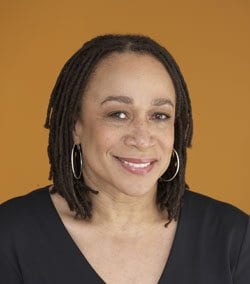
Film, stage and television actress S. Epatha Merkerson — most famous for her role as Lt. Van Buren on NBC’s “Law and Order”— has finally stepped behind the camera to executive produce and co-direct a documentary, “The Contradictions of Fair Hope.”
Through powerful personal stories narrated by Whoopi Goldberg, the film explores the development and loss of tradition of one of the last remaining African American benevolent societies, The Fair Hope Benevolent Society (FHBS) in Uniontown, Ala.
Benevolent societies were formed in response to hunger, illness and financial difficulties newly freed slaves faced just after the Emancipation Proclamation. The Fair Hope Benevolent Society was formed as a way to help bury the dead. The members each paid 10 cents a month to pay for caskets; the remaining money was used to help the sick and finance burials. Later, the members decided to have an annual meeting. Over the last one hundred years, the meeting has been absorbed and overshadowed by an annual festival called “The Foot Wash.”
The festival draws thousands of visitors each year and is known for violence, prostitution and public drunkenness. State troopers come out in large numbers to keep order.
Merkerson — who has appeared in “The Six Wives of Henry Lefay,” “Lackawanna Blues,” TV series “The Closer,” “Pee-wee’s Playhouse” and “The Cosby Show” — will be in Boston June 17 at the Roxbury International Film Festival.
Her film, which won the Paul Robeson award for Best Documentary, closes the festival and she’ll be available for a Q and A session.
Recently, the Banner had a chance to talk to the Golden Globe winning, Tony-Award nominated actress about her directorial debut — which was four years in the making.
How did you get into television? Was that your dream or was there something else?
I think it was pretty organic. I had always done a little bit of acting while I was in school. Then, I made the change to theater. I have a long extended background in theater. I think film [came first and then] television.
What’s been your favorite role?
All of them for different reasons. I don’t necessarily have a favorite role, but I love the theater. It’s been four years and I need to get on stage. I love making films. I can’t say that one thing outshines. But, I guess you want me to be specific (laughs).
I think it was Bernice in “Piano Lesson.” So it’s “Piano Lesson” for theater. For film, “Lackawanna Blues.” I felt “Lackawanna” was so different for me and having the lead for a film was lovely. I have very fond memories of doing that film.
When did you hear about the Fair Hope Benevolent Society?
The co-producer/co-director’s [Rockell Metcalf] grandmother was a member since she was 17, and now she’s in her 90s. She suggested that we look into it. I asked him to go down [to Alabama] in September. When he came back, he had pictures of naked women. [We wanted to know] how did [the benevolent society] end up 124 years later in the middle of the Foot Wash Festival?
The Fair Hope Benevolent Society was created in 1888. The idea that those six men created that as a way to bury their dead was the original idea. The fact that it lasted 124 years is quite extraordinary.
It’s more about the memory really trying to hold on. The youngest person [in the society] is 50. The area is in the black belt in Alabama. It’s one of the poorest counties in the state. They’re still experiencing migration to go to school and find jobs. Will it survive beyond what this festival has become? The Foot Wash Festival has swallowed it up. It’s wild and lawless.
What were some of the challenges you faced?
I think the most difficult part is weeding the story. One hundred twenty-five hours of film gets cut down to 67 minutes. But, you have to make sure you cover all your bases. You have to hold on to that story. [It’s important] not to be swayed to take your mind off of telling the truth.
I was the executive producer, co-director, chief cook and bottle washer. It’s been amazing!
How do you know when you’re done?
Our editing started in May of last year. What we found is that we kept taking things out. We were trying to create and craft the story so that there was no air in it. You start by writing an outline.
As a documentarian, one thing might lead to another subject. So, you have to go in another direction. That’s how you end up with so many hours of film. Rockell and I would sit with Post-it notes all over the walls. And we asked, “Does it move the story along?”
Will you do it again?
Absolutely, with a lot more interest this time. I enjoyed being on the other side of the camera. I like being in charge. I must be an Alpha person (laughs). You have to think on your feet. A lot of that comes with documentary.
I always had an affinity for history. We both love history. That gets us going. We’ve been discussing what our next project will be.






